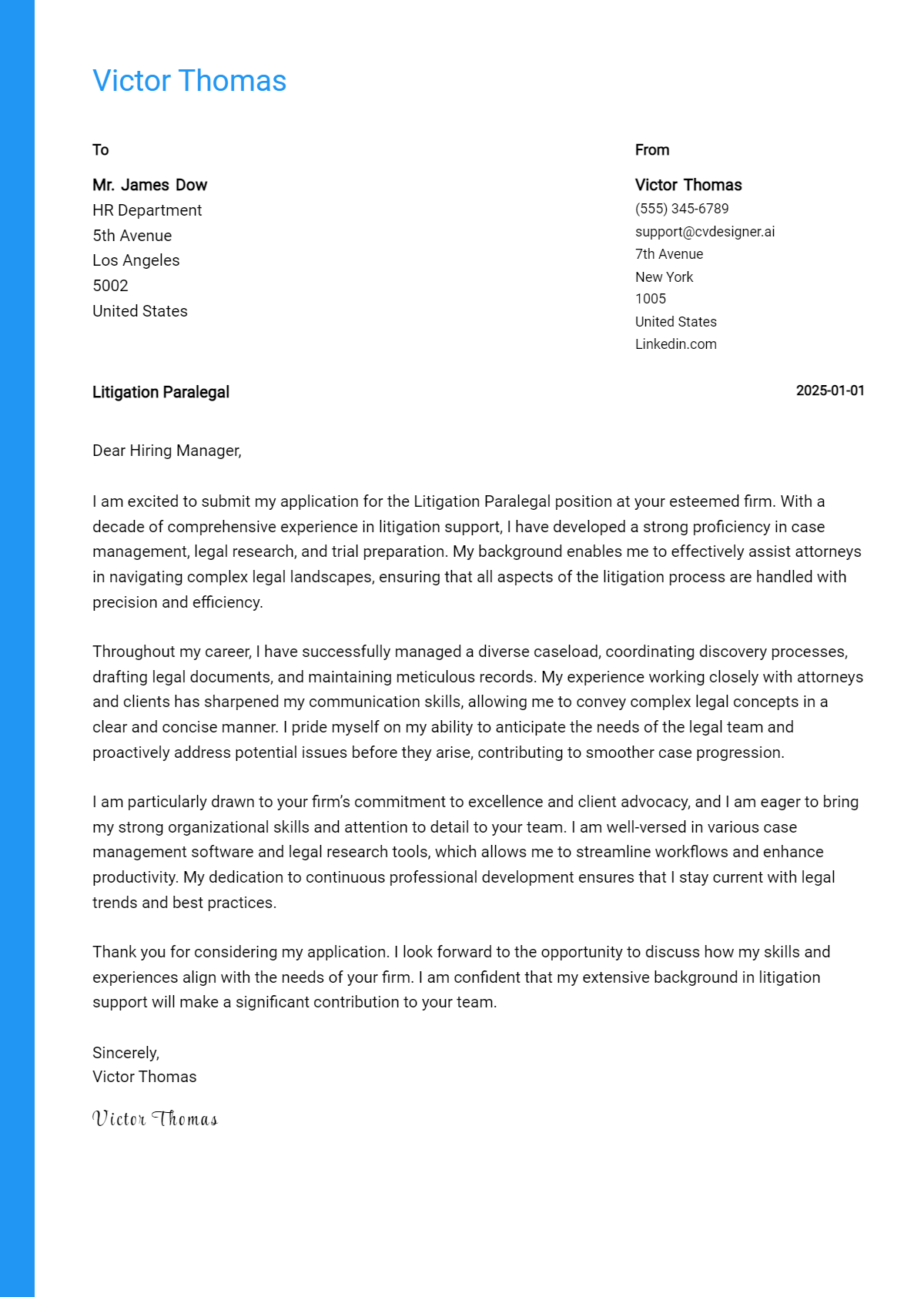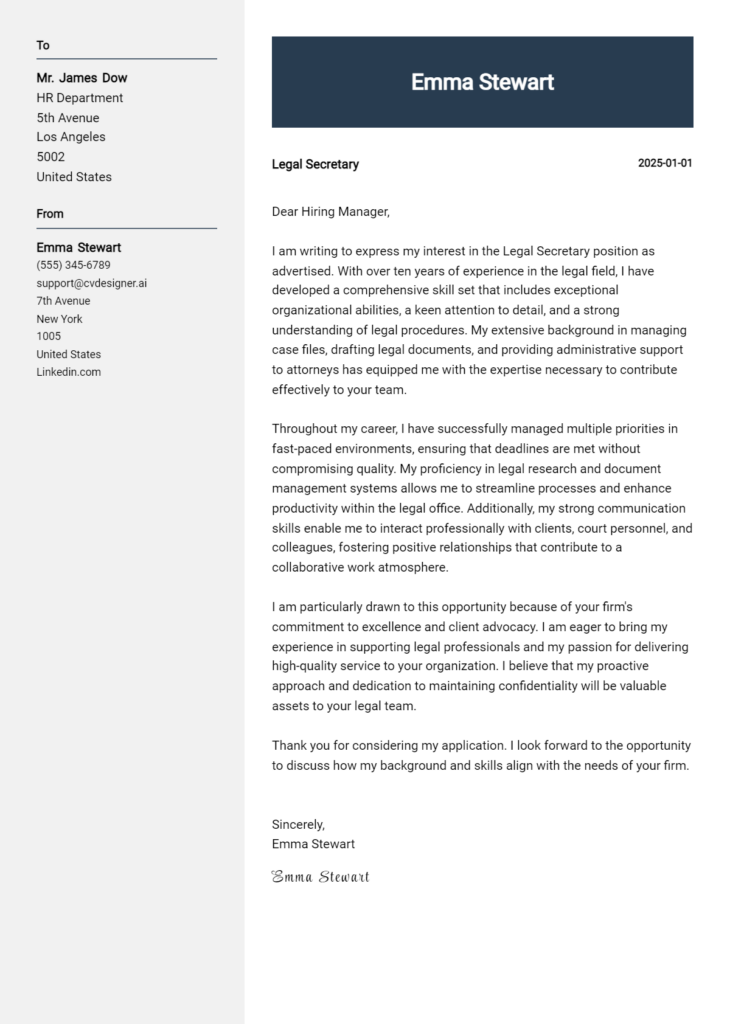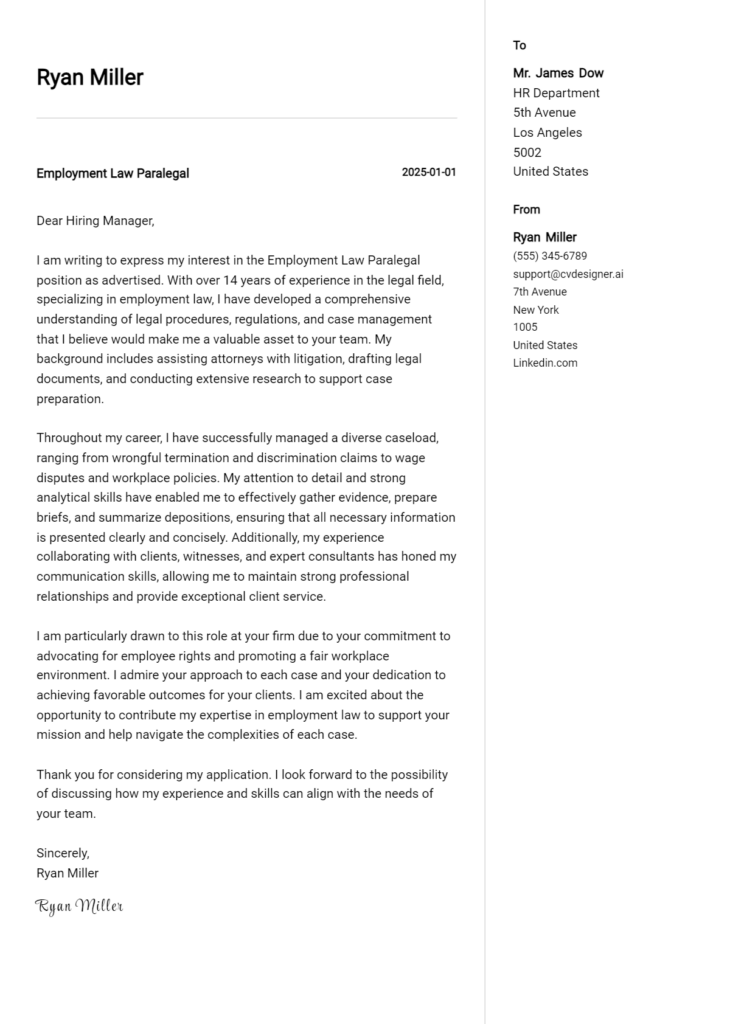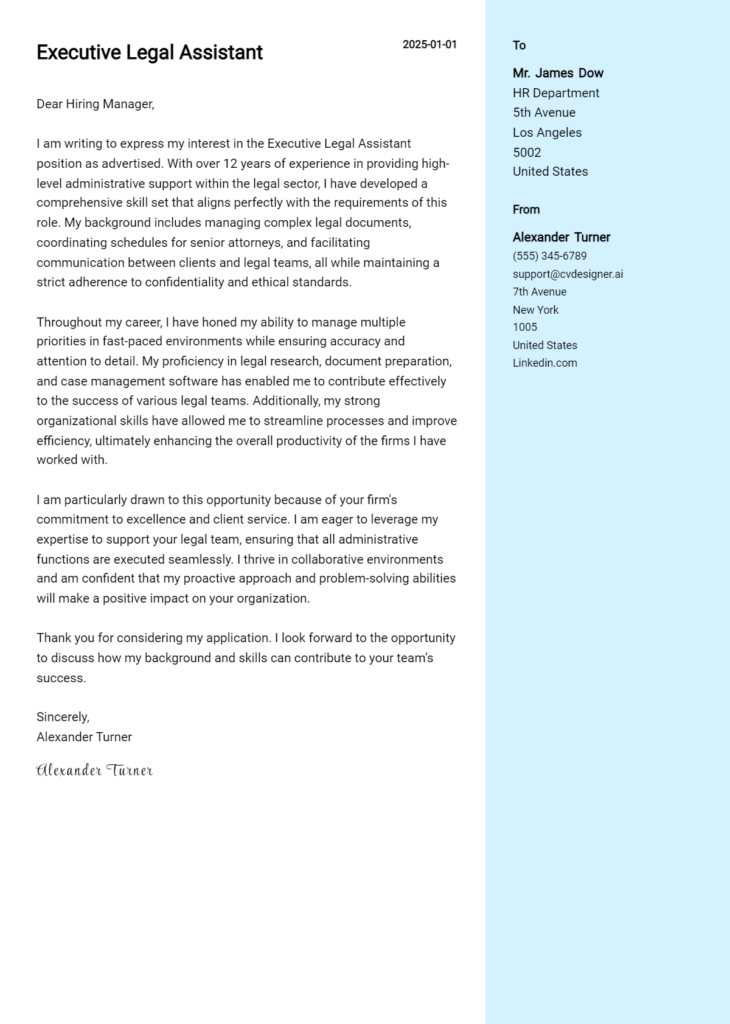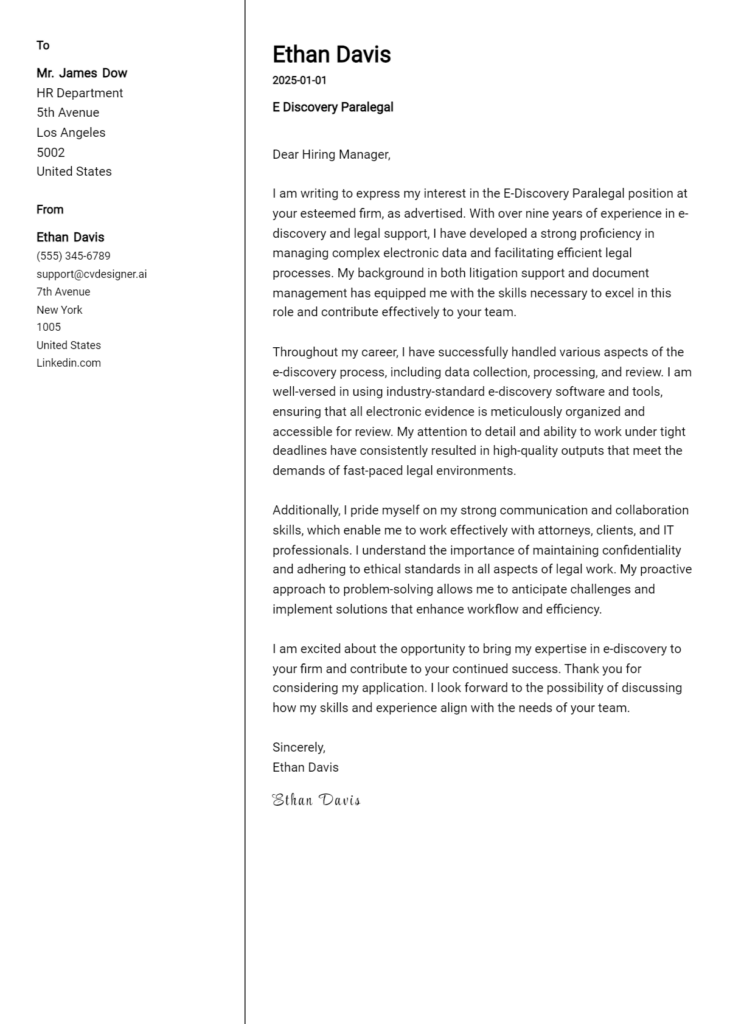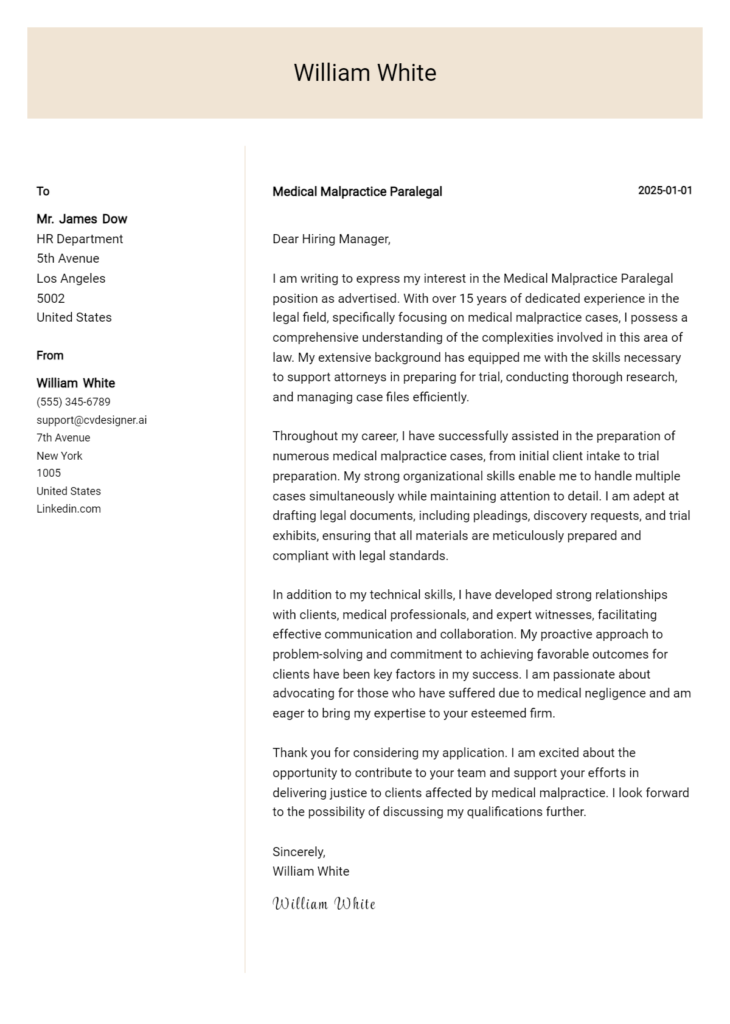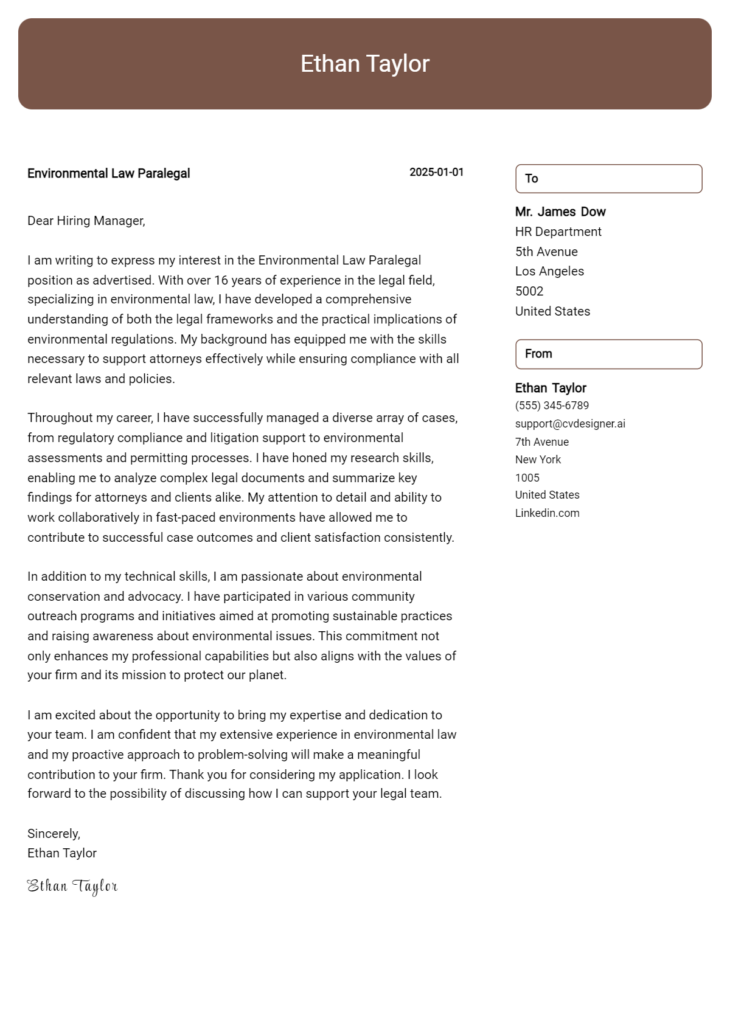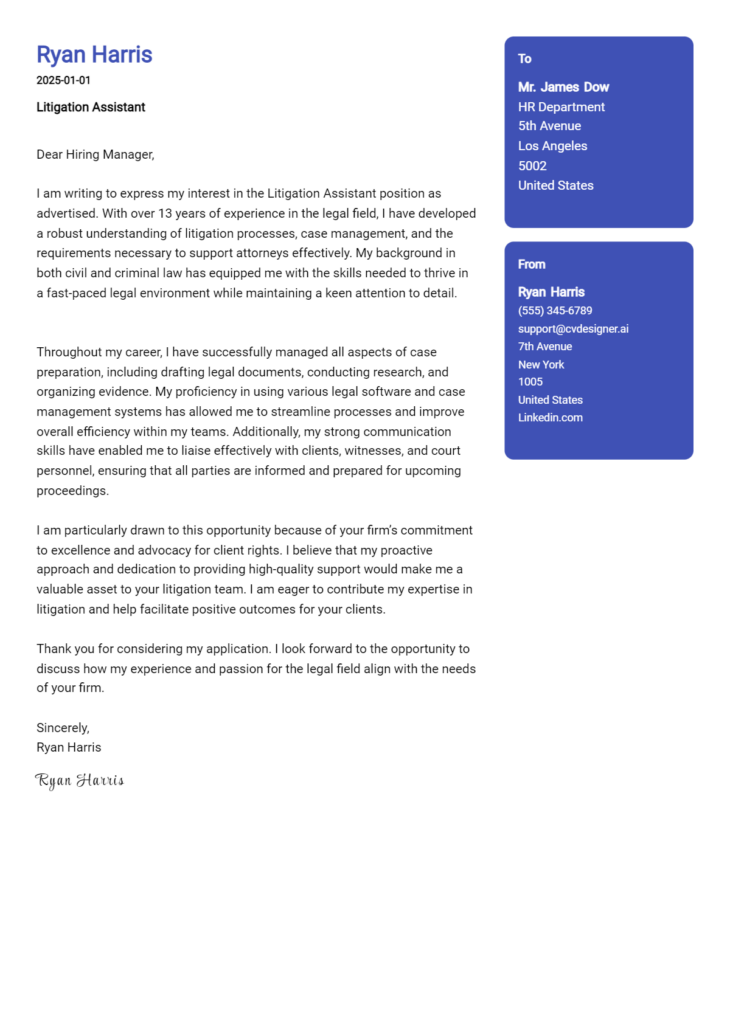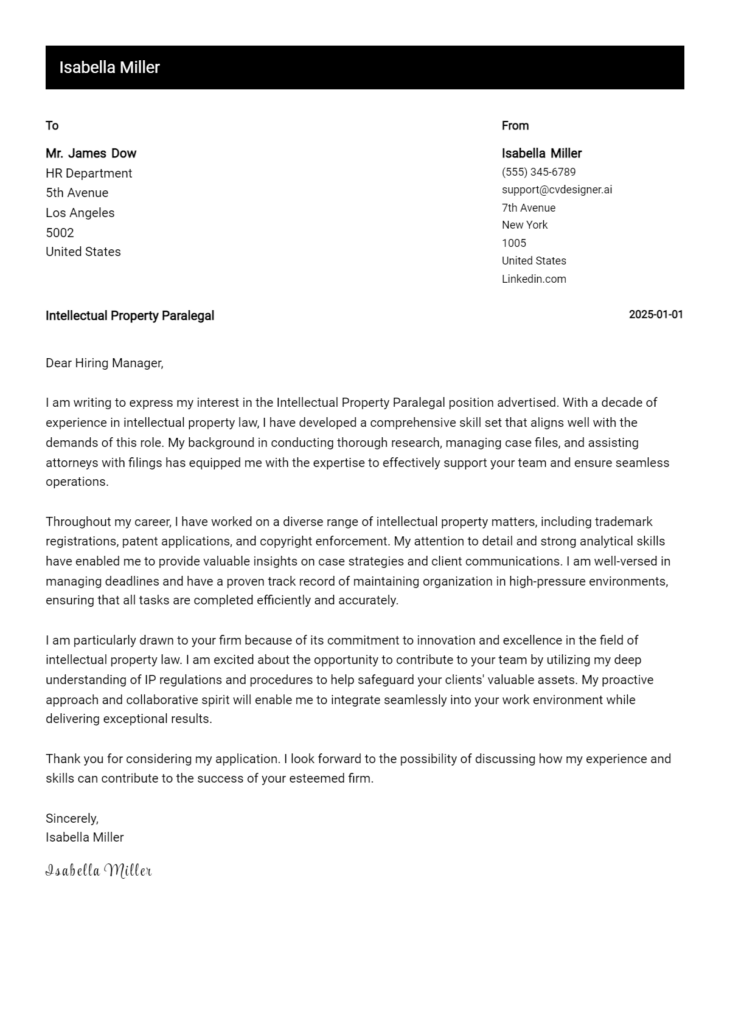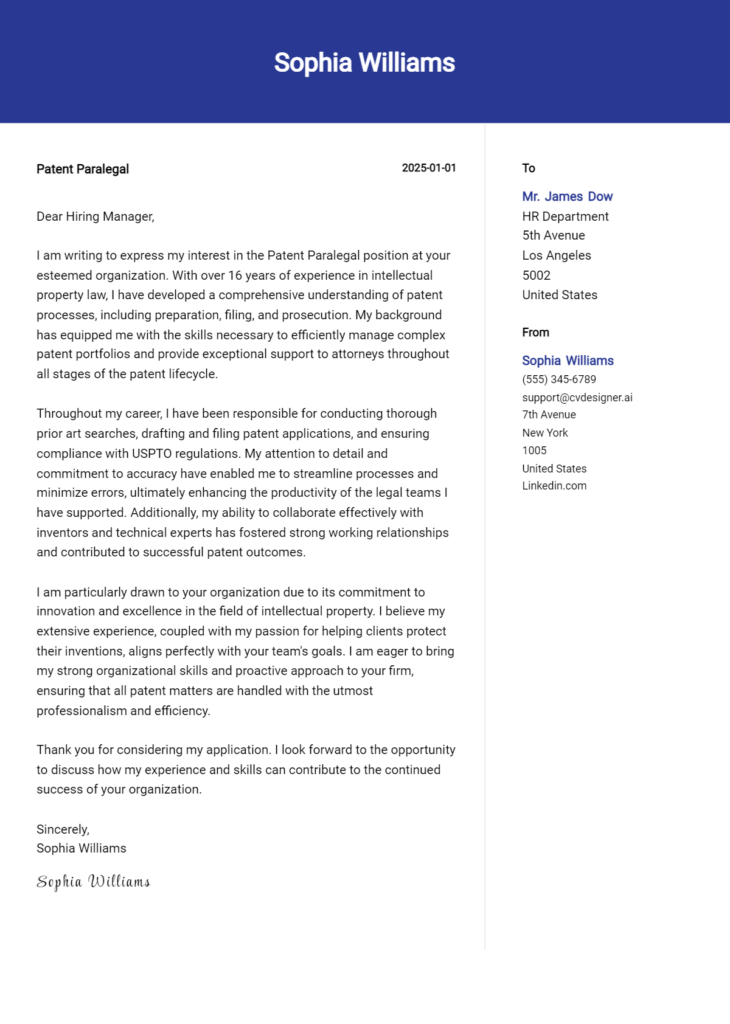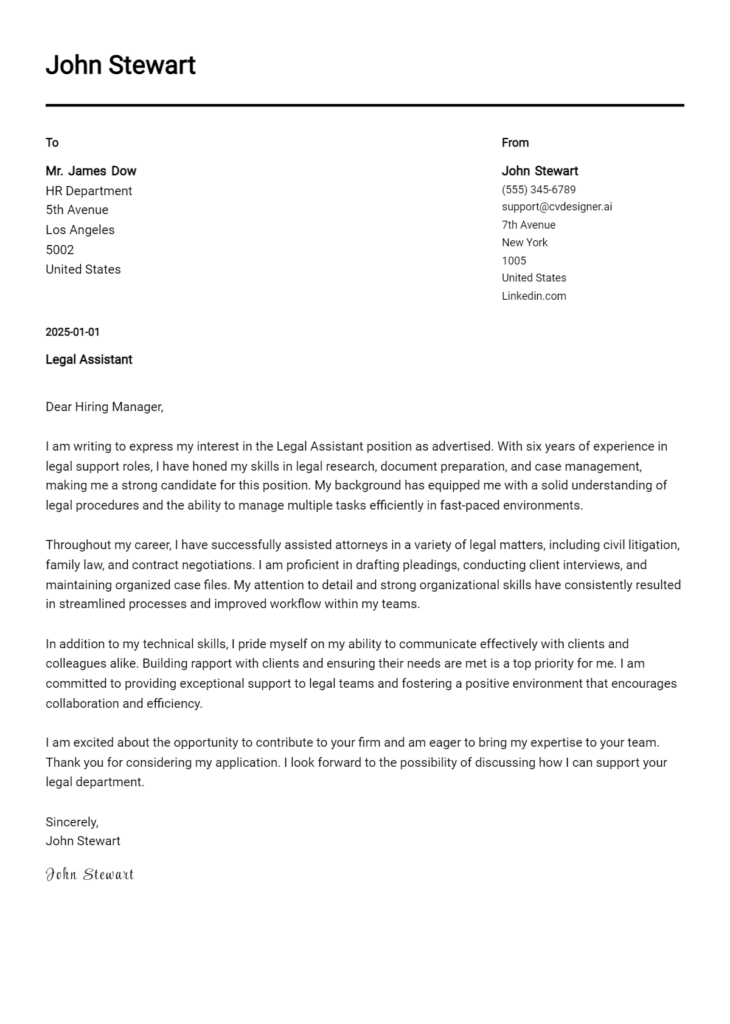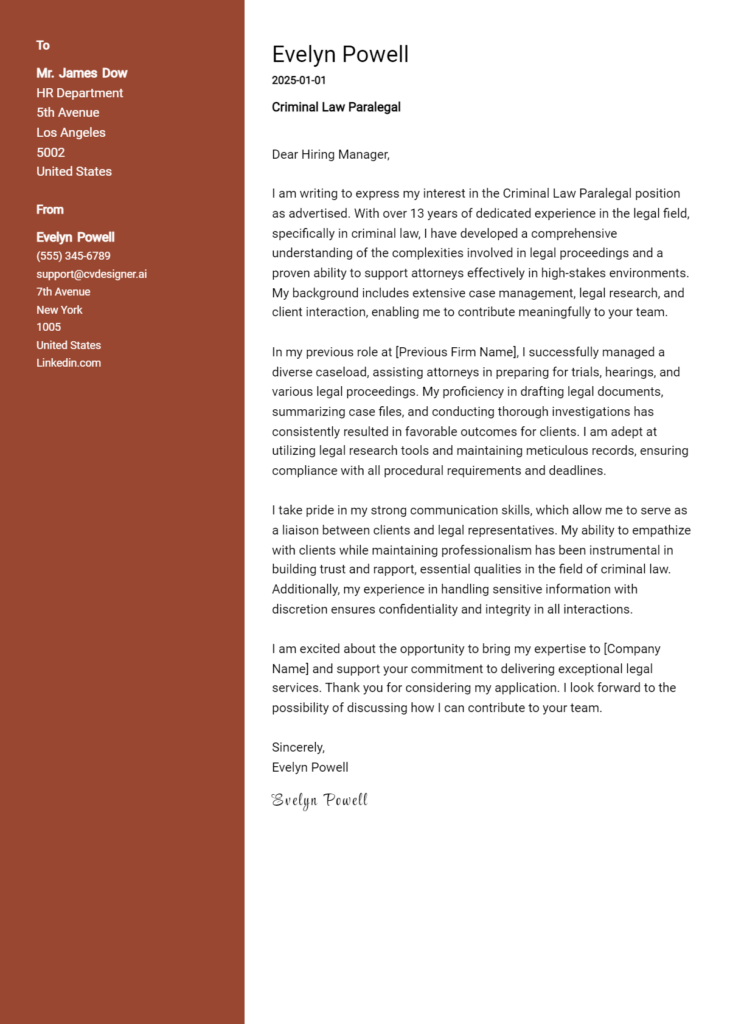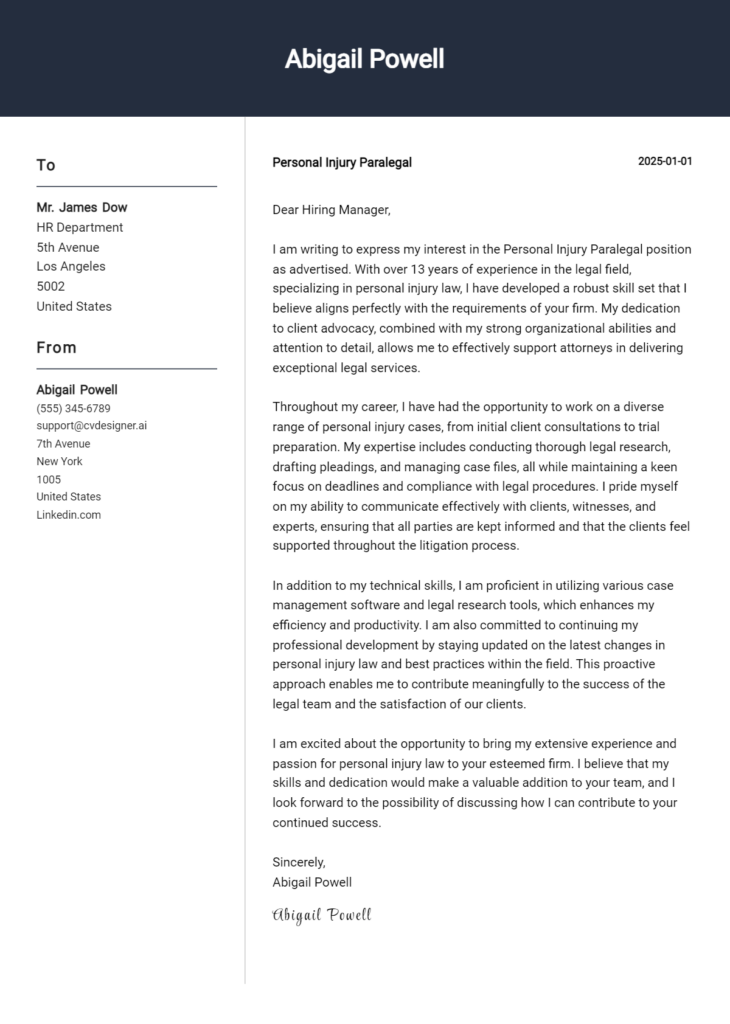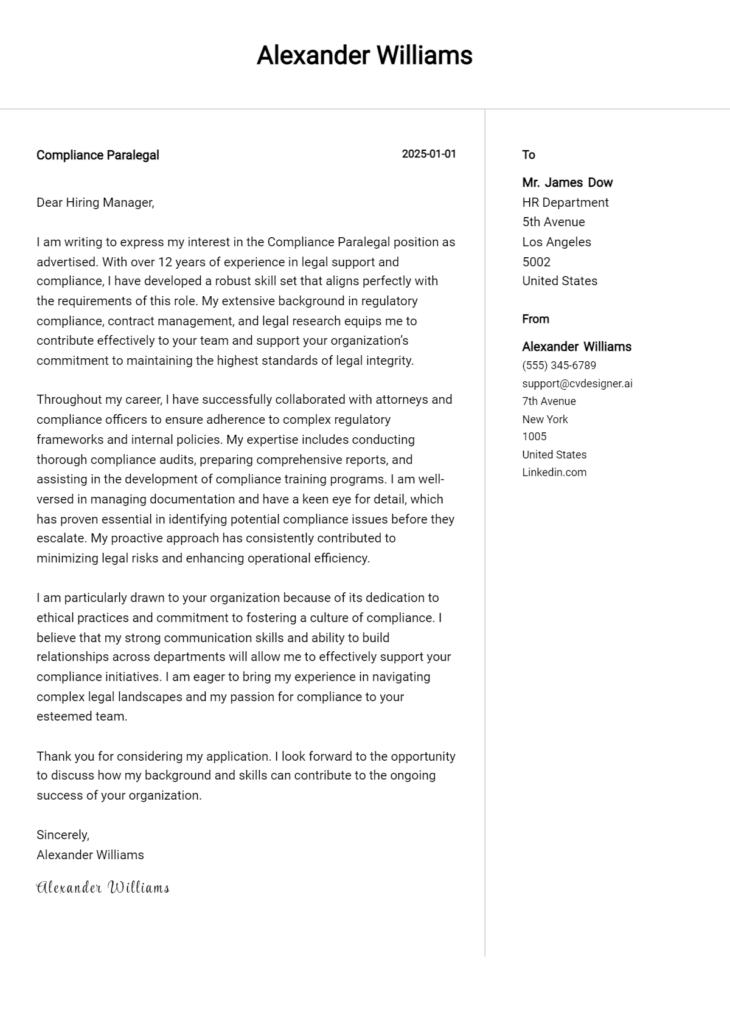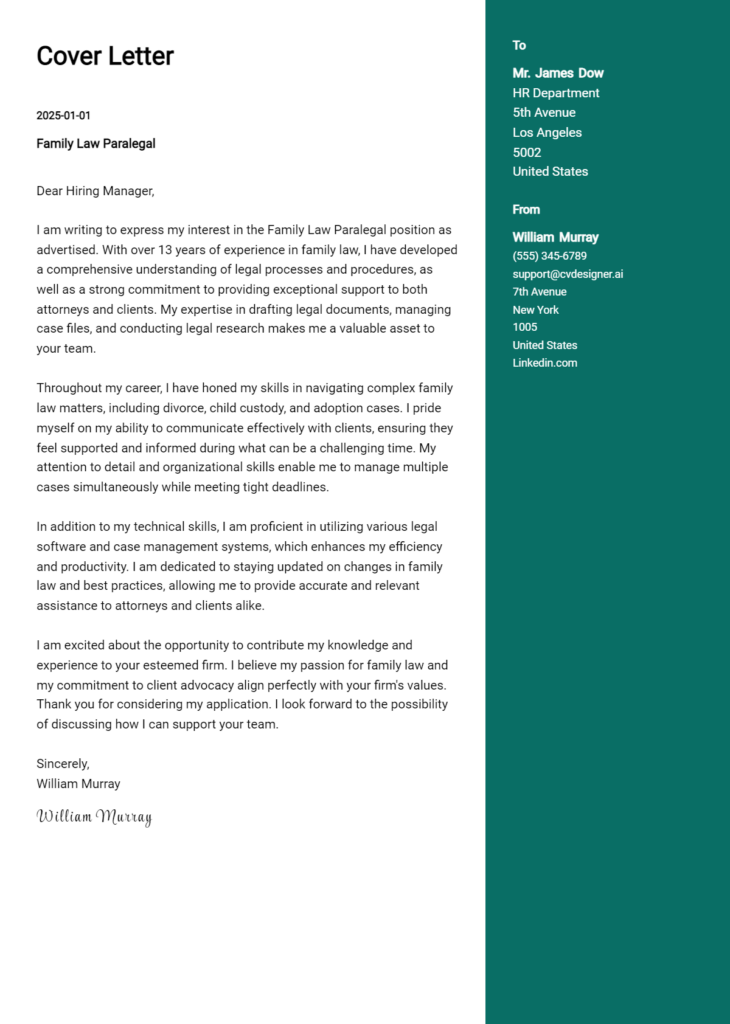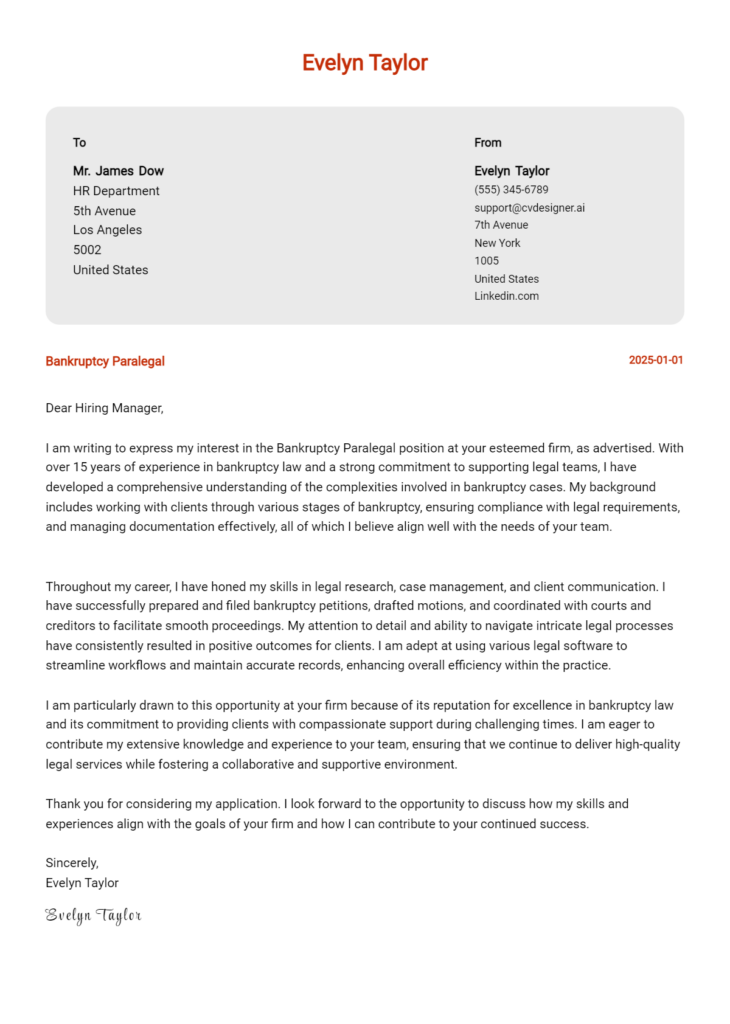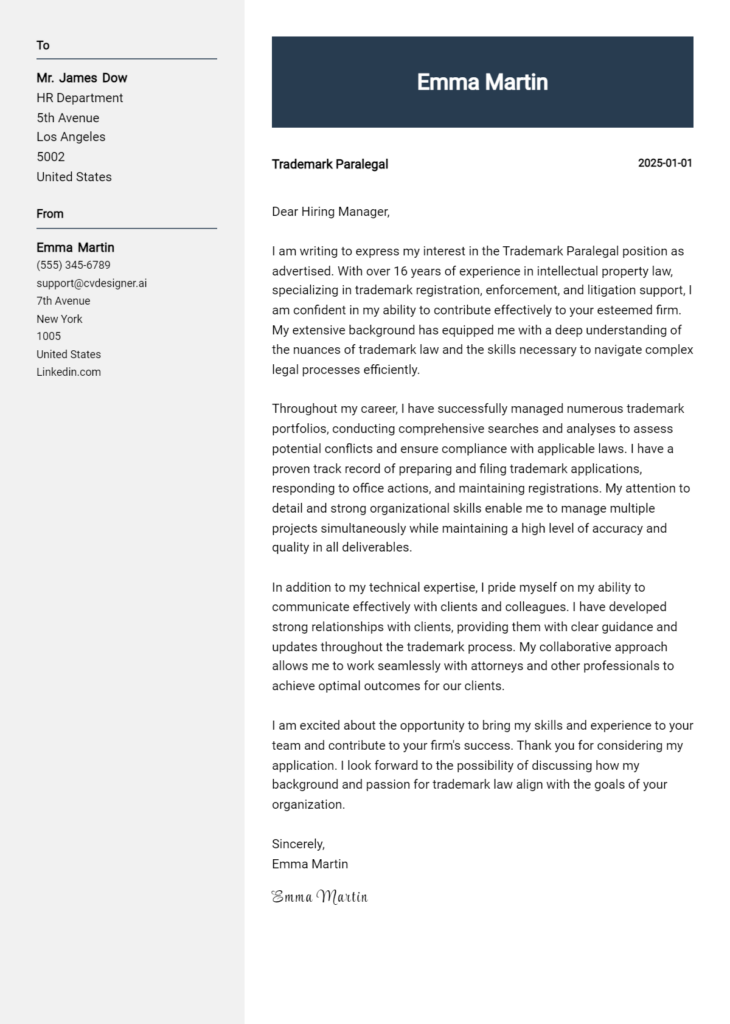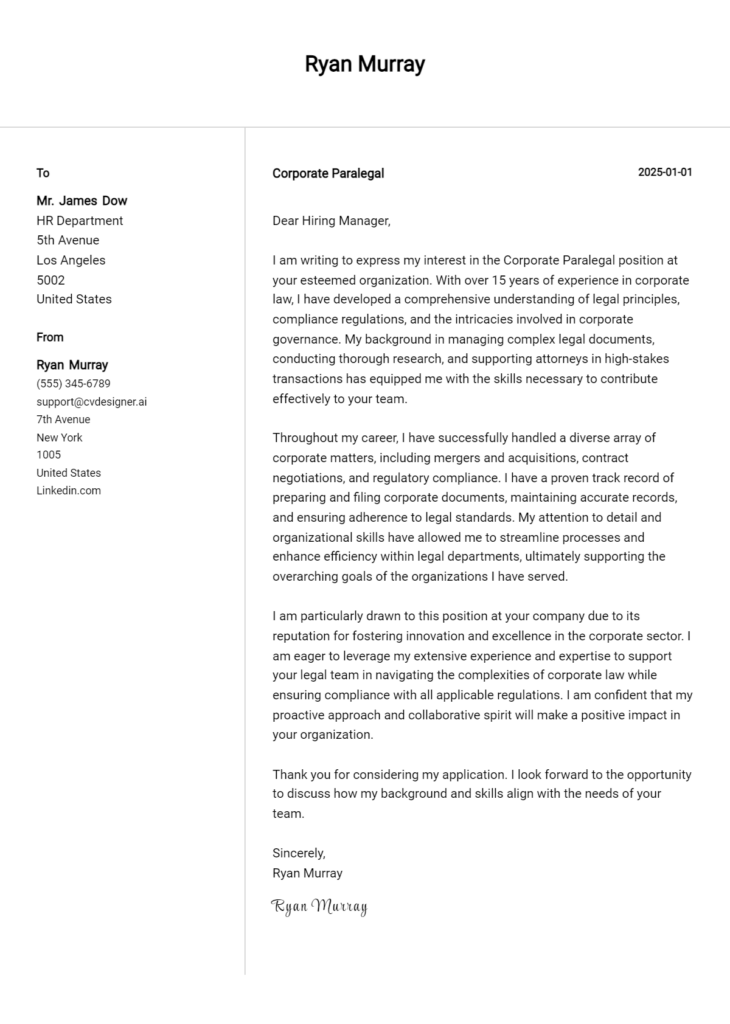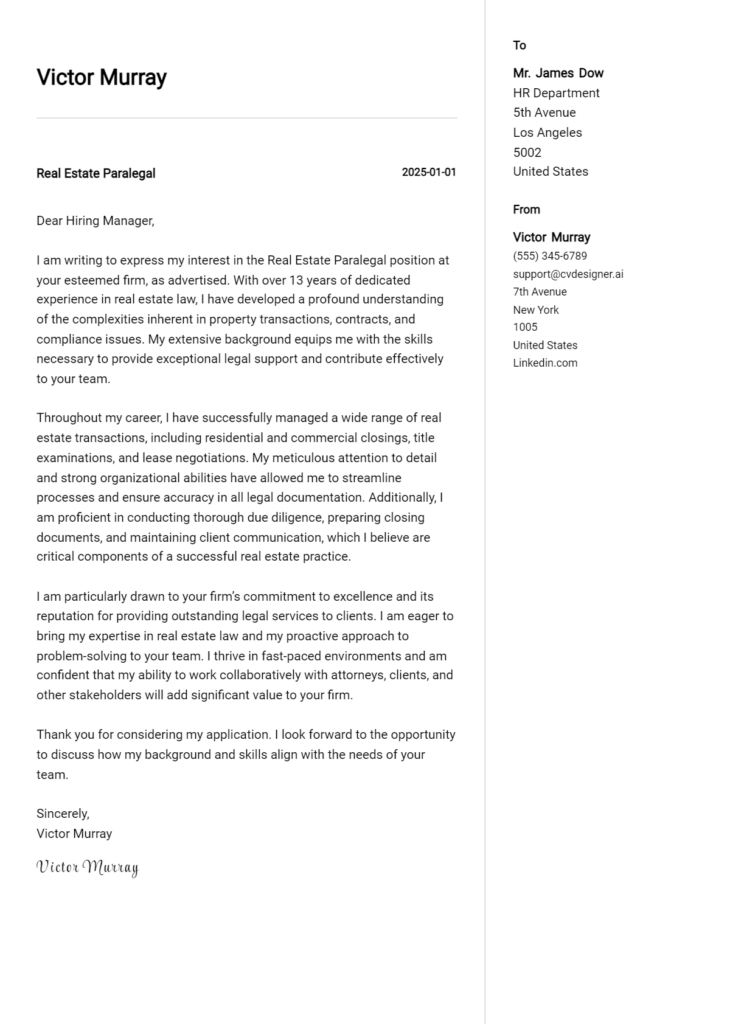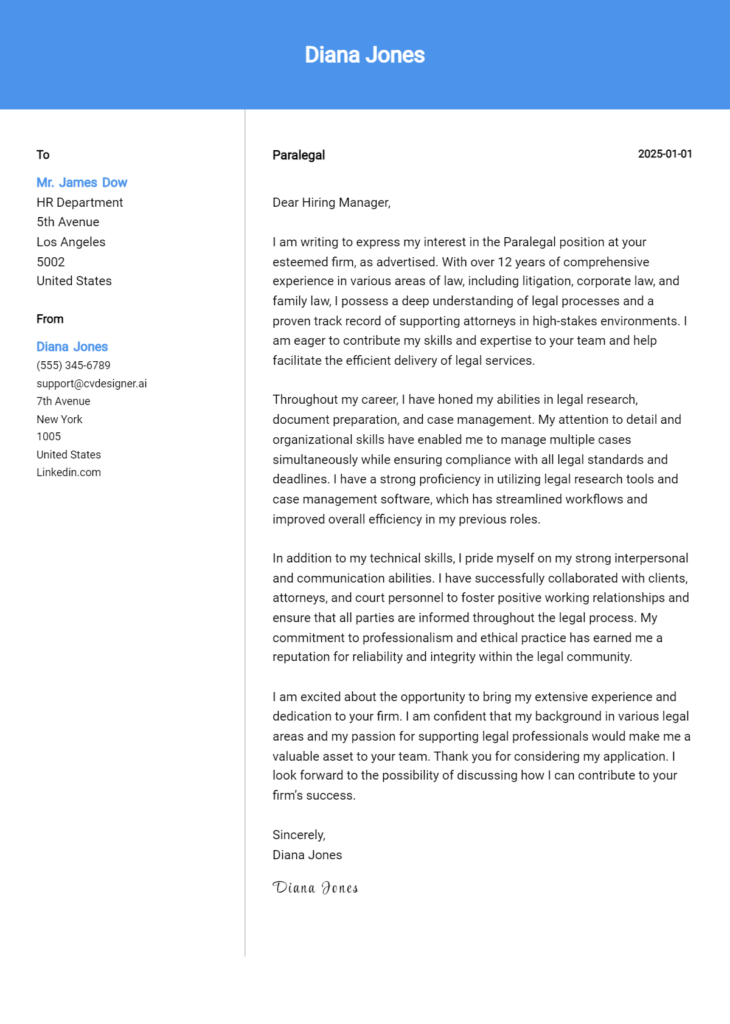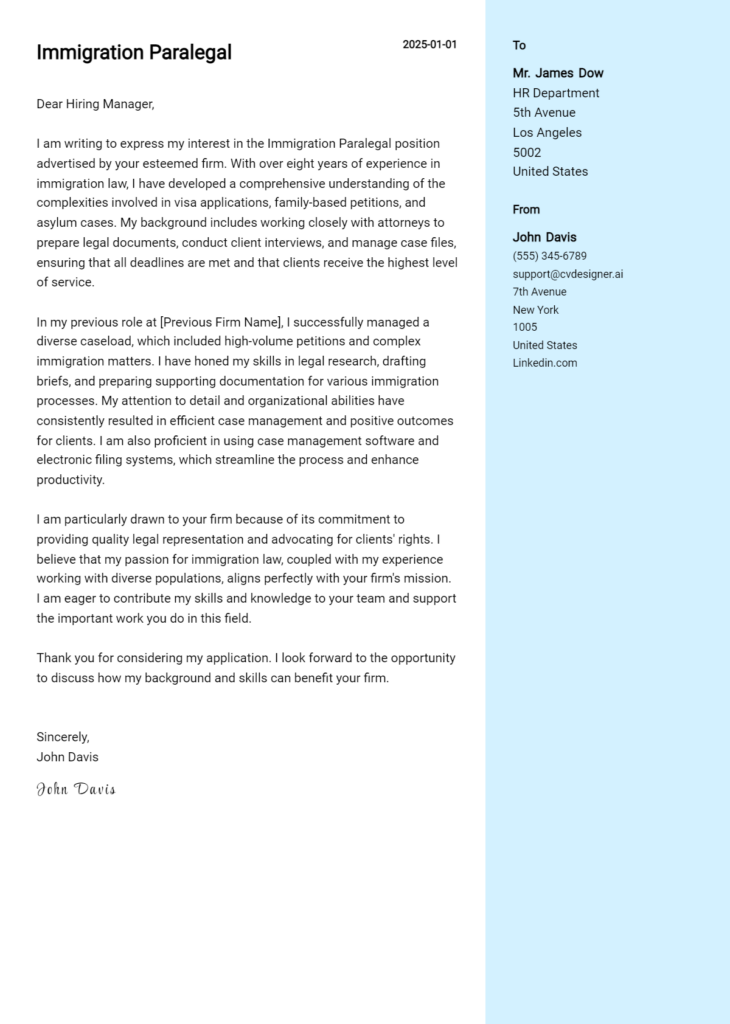Litigation Paralegal Cover Letter Examples
Explore additional Litigation Paralegal cover letter samples and guides and see what works for your level of experience or role.
How to Format a Litigation Paralegal Cover Letter?
Crafting a well-structured cover letter is essential for a Litigation Paralegal, as it not only outlines your relevant experience but also demonstrates your organizational skills and attention to detail—qualities highly valued in the legal profession. The formatting of your cover letter can significantly influence the first impression you make on a hiring manager, showcasing your ability to present information clearly and professionally.
In this guide, we will explore how to effectively structure your cover letter, providing insights and examples tailored specifically for the Litigation Paralegal role.
We’ll focus on the essential components of a professional cover letter, including:
- Cover Letter Header
- Cover Letter Greeting
- Cover Letter Introduction
- Cover Letter Body
- Cover Letter Closing
Each section is crucial in portraying your qualifications and commitment to the legal field. Let’s dive into the details of each part to help your Litigation Paralegal cover letter stand out.
Importance of the Cover Letter Header for a Litigation Paralegal
The cover letter header is a crucial component of any professional application, including for the role of a Litigation Paralegal. It sets the tone for the entire document and provides essential information that helps the recipient identify the sender and the purpose of the correspondence. A well-structured header should include the applicant's contact information, the date, and the recipient's details. Clarity and professionalism in the header not only reflect the candidate's attention to detail but also demonstrate their understanding of formal communication, which is vital in the legal field.
A strong header communicates that the applicant is organized and serious about the position, while a weak header can create an impression of carelessness or lack of professionalism.
Strong Example
Jane Doe 123 Main Street City, State, Zip Code jane.doe@email.com (123) 456-7890 October 1, 2023 Mr. John Smith Hiring Manager Law Firm Name 456 Elm Street City, State, Zip Code
Weak Example
Jane jane@email.com 1 Oct John
The Importance of a Cover Letter Greeting for a Litigation Paralegal
The greeting of a cover letter serves as the initial point of contact between the applicant and the hiring manager, setting the tone for the rest of the letter. A well-crafted greeting not only showcases professionalism but also establishes a personal connection by addressing the recipient directly. This personalization can make a significant difference in capturing the reader's attention and demonstrating genuine interest in the position. To avoid generic greetings that can come across as impersonal, it's essential to research the hiring manager's name when possible. A tailored greeting reflects effort and shows that you care about the application process.
Here are examples of strong and weak greetings for a Litigation Paralegal cover letter:
Strong Greeting Example
Dear Ms. Johnson,
Weak Greeting Example
To Whom It May Concern,
The Importance of a Strong Cover Letter Introduction for a Litigation Paralegal
A compelling cover letter introduction is crucial for a Litigation Paralegal position as it serves as the first impression to the hiring manager. This opening paragraph should not only capture attention but also convey genuine interest in the role while highlighting relevant skills or notable achievements. A strong introduction sets the tone for the rest of the letter, making it more likely that the reader will continue to engage with the application. Conversely, a weak introduction can diminish the candidate’s chances of making a positive impact, leading to a missed opportunity. Below are examples of strong and weak cover letter introductions for a Litigation Paralegal position.
Strong Example
Dear [Hiring Manager's Name], I am excited to apply for the Litigation Paralegal position at [Company Name], as advertised on [Where You Found the Job Posting]. With over five years of experience supporting complex litigation cases and a proven track record in legal research and document management, I am eager to contribute my skills to your esteemed firm. My dedication to detail and passion for the law have equipped me to effectively assist attorneys in preparing for trials and ensuring that all procedural requirements are met.
Weak Example
Dear Sir or Madam, I am writing to apply for the Litigation Paralegal job. I have worked in some law firms and have some experience with legal documents. I think this position might be interesting to me.
Purpose of the Cover Letter Body for a Litigation Paralegal
The body of a cover letter for a Litigation Paralegal serves as a critical platform for candidates to articulate their qualifications and the unique value they bring to a law firm. This section is where applicants can highlight their relevant skills, such as legal research, case management, and familiarity with court procedures, while also discussing specific projects or accomplishments that demonstrate their expertise. By detailing experiences that align with the firm’s needs, candidates can effectively convey their ability to contribute to the team and support attorneys in achieving favorable outcomes for clients.
Strong Example
Dear [Hiring Manager's Name], I am writing to express my interest in the Litigation Paralegal position at [Company Name]. With over five years of experience in litigation support, I have successfully managed multiple cases from inception through trial. For instance, while working at [Previous Company], I played a vital role in a complex commercial litigation case that resulted in a $2 million settlement for our client. I conducted extensive legal research, drafted pleadings, and collaborated closely with attorneys to develop case strategies. My proficiency in utilizing e-discovery tools and case management software has significantly streamlined our workflow, ensuring that deadlines are met efficiently. I am excited about the opportunity to bring my skills and dedication to [Company Name] and contribute to your team’s success. Sincerely, [Your Name]
Weak Example
Dear [Hiring Manager's Name], I am interested in the Litigation Paralegal position at [Company Name]. I have worked in legal settings before and have some experience with paperwork and filing. I think I would do a good job at this role because I like working in law. I have helped on several cases, but I can't remember the specifics. I am looking for a job where I can learn more about litigation and grow my career. I hope to hear back from you soon. Best, [Your Name]
Importance of the Cover Letter Closing for a Litigation Paralegal
The closing paragraph of a cover letter is crucial for leaving a lasting impression on a potential employer. For a Litigation Paralegal, this section should effectively summarize your qualifications, reiterate your interest in the position, and encourage the hiring manager to take the next steps, such as reviewing your resume or scheduling an interview. A strong closing can reinforce your suitability for the role and demonstrate your enthusiasm, while a weak closing may leave the impression of disinterest or lack of professionalism.
Strong Example
Thank you for considering my application for the Litigation Paralegal position at [Company Name]. With my extensive experience in legal research and case management, coupled with my passion for supporting litigation teams, I am excited about the opportunity to contribute to your esteemed firm. I look forward to the possibility of discussing how my skills can align with your needs. Please feel free to review my attached resume, and I would be eager to schedule an interview at your earliest convenience.
Weak Example
I hope you like my application. I think I can do the job. If you want to talk, you can call me or something. Thanks for your time.
These tips will help candidates craft an effective cover letter for a Litigation Paralegal position. A well-written cover letter is crucial in making a strong first impression on potential employers, as it allows you to showcase your unique blend of technical skills, problem-solving capabilities, knowledge of the Software Development Life Cycle (SDLC), teamwork experience, and a passion for continuous learning.
Tips for Writing an Effective Cover Letter for a Litigation Paralegal
Highlight Technical Skills
Clearly outline your technical skills relevant to the role, such as proficiency in legal research software, case management systems, and document automation tools. Mention specific programs you are familiar with, which can set you apart from other candidates. A comprehensive understanding of these tools demonstrates your readiness to support attorneys in complex litigation cases.Emphasize Problem-Solving Abilities
Litigation often involves unexpected challenges. Provide examples from your past experiences where you successfully navigated obstacles or devised creative solutions. This not only shows your ability to think critically but also highlights your proactive approach to legal matters, which is essential in a fast-paced environment.Demonstrate SDLC Knowledge
If applicable, mention your familiarity with the Software Development Life Cycle (SDLC) and how it relates to the legal field, especially in areas like e-discovery and compliance. This knowledge can be a valuable asset, illustrating your understanding of how technology can enhance legal processes and improve efficiency.Showcase Teamwork Skills
Litigation is rarely a solo endeavor; it requires collaboration with various stakeholders. Share experiences where you successfully worked as part of a team, whether in a legal setting or a different environment. Emphasizing your ability to communicate effectively and contribute to a group dynamic will reassure potential employers of your compatibility with their firm’s culture.Express a Passion for Continuous Learning
The legal field is constantly evolving, and it’s essential to stay updated with new laws and technologies. Convey your commitment to professional development by mentioning relevant courses, certifications, or seminars you have attended. This dedication to continuous learning not only enhances your qualifications but also demonstrates your enthusiasm for the profession.
By incorporating these tips into your cover letter, you can create a compelling narrative that captures your qualifications as a Litigation Paralegal. For additional resources, consider exploring cover letter templates or using a cover letter builder to streamline the writing process.
Common Mistakes to Avoid in a Litigation Paralegal Cover Letter
Crafting an effective cover letter is essential for standing out in the competitive field of litigation paralegals. Avoiding common mistakes can significantly enhance your chances of making a positive impression. Here are some frequent pitfalls to watch for:
Generic Greetings: Using vague salutations like "To Whom It May Concern" can appear impersonal. Instead, research the hiring manager’s name and address them directly.
Lack of Specificity: Failing to tailor your cover letter to the specific job description can lead to missed opportunities. Highlight relevant experiences and skills that align with the position you're applying for.
Overly Formal Language: Writing in an excessively formal tone can make your letter feel stiff. Aim for a professional yet conversational style that reflects your personality.
Ignoring Formatting Guidelines: Adhering to proper cover letter format is crucial. Ensure your letter is well-structured and easy to read; consider reviewing cover letter format guidelines for assistance.
Repetition of the Resume: Your cover letter should complement your resume, not repeat it. Use this opportunity to elaborate on key experiences or explain how they relate to the role.
Spelling and Grammar Errors: Mistakes can undermine your professionalism. Proofread your letter multiple times and consider using tools or asking someone else to review it.
Neglecting a Strong Closing: Failing to end with a strong call to action can leave a weak impression. Conclude by expressing enthusiasm for the position and inviting the employer to discuss your application further.
By steering clear of these mistakes and focusing on crafting a compelling narrative, your cover letter can effectively showcase your qualifications as a litigation paralegal. For additional inspiration, check out various cover letter examples to help you get started.
Cover Letter FAQs for Litigation Paralegal
What should I include in my cover letter as a Litigation Paralegal?
In your cover letter, you should include your relevant experience, skills, and education that align with the requirements of the Litigation Paralegal position. Start with a strong introduction that states the job you’re applying for and how you learned about it. Highlight your familiarity with legal research, document preparation, case management, and any specific litigation software you’ve used. Mention your ability to support attorneys during trials and your experience with court filings. Additionally, articulate your attention to detail and organizational skills, which are crucial in litigation. Conclude with a call to action, expressing your enthusiasm for the role and your desire for an interview.
How can I make my cover letter stand out?
To make your cover letter stand out, personalize it for each job application. Use the hiring manager's name if possible, and tailor your content to reflect the specific requirements mentioned in the job description. Incorporate keywords that match the job listing, showcasing your relevant experience and skills. Use quantifiable achievements to demonstrate your impact, such as the number of cases you managed or improvements you made in document management processes. Additionally, express your passion for litigation and your commitment to supporting the legal team. A well-structured, error-free, and professional format will also help your letter stand out.
Should I include legal terminology in my cover letter?
Yes, incorporating relevant legal terminology can demonstrate your familiarity with the field and enhance your credibility. Use terms such as "discovery," "motions," "briefs," and "depositions" where appropriate to convey your knowledge and experience in litigation. However, be careful not to overuse jargon or make your letter overly technical, as this could alienate readers who may not be familiar with legal terms. Strike a balance by ensuring that your language is accessible while still reflecting your expertise. This approach will not only highlight your qualifications but also illustrate your ability to communicate effectively in a legal context.
How long should my cover letter be?
A cover letter for a Litigation Paralegal position should ideally be one page long, typically consisting of three to four paragraphs. Aim for about 300 to 400 words. This length is sufficient to convey your qualifications and enthusiasm without overwhelming the reader. Begin with a strong introduction, followed by a few paragraphs detailing your relevant experience, skills, and achievements. Conclude with a compelling closing statement that reiterates your interest in the position and invites further discussion. Keeping your cover letter concise and focused will make it easier for hiring managers to quickly assess your qualifications, increasing your chances of being selected for an interview.
Build your Cover Letter in minutes
Use an AI-powered cover letter builder and have your letter done in 5 minutes. Just select your template and our software will guide you through the process.

